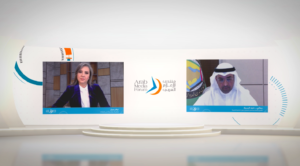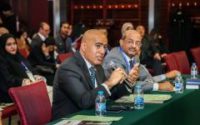19th Arab Media Forum Hosts GCC Secretary-General At Virtual Session
His Excellency Dr. Nayef Falah Mubarak Al-Hajraf, Secretary-General of the Gulf Cooperation Council (GCC) stressed that the Council has been a key stabilising factor in the region for over four decades, and has played a key role in maintaining worldwide peace and security by supporting various global causes including the fight against terrorism.
The GCC Secretary-General’s remarks came during a session held at the 19th Arab Media Forum (AMF) organised virtually today by the Dubai Press Club under the patronage of His Highness Sheikh Mohammed bin Rashid Al Maktoum, VicePresident and Prime Minister of the UAE and Ruler of Dubai, who attended the event remotely. Al-Hajraf was answering questions posed byNaouferRamoul, TV anchor, Dubai Media Incorporated.
Speaking at the Forum held under the theme ‘Arab Media: The Future is Digital’, Al-Hajraf highlighted the strategic importance of stability in the GCC since the region isa vital artery for global energy supplies. GCC states have upheld their responsibility to secure the global availability of oil and gas despite geopolitical challenges. The Council plays a key role in promoting security and stability in the Middle East and the world at large, he said.
Prospects for Peace
On the prospects for greater peace in the region through accords with Israel, Al-Hajrafaffirmedthe Gulf Cooperation Council’s (GCC) firm support for the right of the Palestinian people in accordance with United Nations resolutions. He also stressed that the GCC has been a strong advocate for world peace based on a belief that it is a major driver of human development and welfare.
Recalling the Arab Peace Initiative of the late Saudi King Abdullah bin Abdulaziz Al Saudproposed at the Arab League Summit in Beirut in 2002, Al-Hajraf said it might be an opportune time for Israel to reconsider this initiative as a solution to achieve comprehensive peace in the region, which reflects the broader stance of Arab states on achieving a peaceful resolution of the issue.
The GCC Secretary-General said the Arab initiative for a two-state solution to the Palestinian-Israeli conflict is aligned with the Palestinians’ right for a sovereign state based on the 1967 borders, with Eastern Jerusalem as its capital.
Cooperation is key to tackling challenges
Answering a question on how the relationship between GCC states helps combat diverse challenges, most notably terrorism, Al-Hajraf said the close cooperation and coordination between GCC states has helped defuse various security threats since the establishment of the Council.
“The GCC has been successful innavigating major challenges such as the Iranian Revolution, the Iraq-Iran war and the Iraqi invasion of Kuwait.Globally, the Council has stood firmly with the international community to fight terrorism, especially after the 9/11 attacks,” Al-Hajraf said.
On the so-called ‘Arab Spring’, Al-Hajraf praised the ability of the GCC to maintain its stability at a time when a number of countries in the region continue to face turmoil. The senior official noted that GCC countries have demonstrated positivity amidst the prevailing global circumstances. Saudi Arabia’s successful organisation of the G20 Summit in Riyadhreflects its influential global role. In addition, the UAE is gearing up to host Expo 2020 next year.
“We are confident that Dubai will deliver an exceptional ‘Expo 2020’ as promised. Hosting this global event reflects positively not only on Dubai and the UAE, but on the Gulf region as a whole,” Al-Hajraf asserted.
Arab Media
Answering a question on the state of the Arab media in terms of conciliatory vs. incendiary agendas, the GCC Secretary-General stressed the importance of responsible journalism and maintaining credibility and professionalism.
“With the emergence of non-traditional media, in which individuals take centre stage, media institutions must adapt and revise their strategies for engaging with their audiences and regaining their trust,” Al-Hajraf said.
Al-Hajrafpraised the Arab Media Forum for selecting ‘The Future is Digital’ as the theme for this edition of the event to highlight the challenges facing regional media institutions that are at the crossroads of a digital transformation.
“Arab media should use digital age tools to catalyse development, strengthen their influence, raise their credibility and objectivity, and embrace technology as the way forward,” Al-Hajraf noted.
On the lessons learned in 2020, His Excellency Dr. Nayef Al-Hajarf said the most important lesson of 2020 is that nations cannot face challenges individually, and that cooperation is the only way to overcome difficult circumstances.
“The COVID-19 pandemic underlined the importance of collective action as the best way to overcome challenges.It has had a profound impact on people’s lives. Preparing to deal with the consequences of global crises is every nation’s responsibility. It is only by working together that we can help create a brighter future for the generations to come, Al-Hajraf concluded.
Held under the theme ‘Arab Media: The Future is Digital’, the 19th edition of the Arab Media Forum saw more than 10,000 people tune in to the Forum’s sessions, which were broadcast live on a special platform set up for the Forum and through the live feature on DPC’s official Twitter, Facebook and Instagram accounts. The Arab Journalism Award ceremony, which honoured 11 outstanding journalists in the Arab world, was also broadcast live.
The largest gathering of media industry stakeholders in the region, the annual Arab Media Forum has provided a platform over the last two decades to discuss ideas and solutions for enhancing the progress and prosperity of the region.







